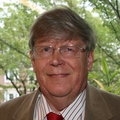Olli Heinonen
Speaker

Before joining the Belfer Center for Science and International Affairs, Harvard Kennedy School of Government, as a senior fellow in 2010, Olli Heinonen served 27 years at the International Atomic Energy Agency in Vienna. For the last five years Heinonen was Deputy Director General of the IAEA and head of its Department of Safeguards. He led the Agency’s efforts to identify and dismantle nuclear proliferation networks, including the one led by Pakistani scientist A.Q. Khan and he oversaw its efforts to monitor and contain Iran’s nuclear programme. Heinonen led teams of international investigators around the world to examine nuclear programmes of concern and inspected nuclear facilities in South Africa, Iraq, North Korea, Syria, Libya and elsewhere, seeking to ensure that nuclear materials were not diverted for military purposes. He is considered one of the world’s leading experts on Iran’s nuclear programme. In recent years, he led the Agency’s efforts to implement an analytical culture to guide and complement traditional verification activities.
Prior to joining the IAEA, he was Senior Research Officer at the Technical Research Centre of Finland Reactor Laboratory, in charge of research and development related to nuclear waste solidification and disposal.
ZAK asked Dr Olli Heinonen to answer the following questions:
1. Has our need for security grown or merely our perception of insecurity?
In the area of nuclear security, it is always better to be safe than sorry. We live in an increasingly complex and changing world. While some countries are cutting back or renouncing nuclear power, there are also an increasing number of countries, including new countries, pursuing nuclear energy. We need to look at the unique situation such a development brings and the increase in spent fuel from nuclear power plants that follow. There is also a constant need to review nuclear safety and security measures. This must remain a dynamic process for all. The Fukushima nuclear accident a year ago is a stark reminder. A recent report of the Nuclear Threat Initiative further indicates that there is no reason for complacency in nuclear security.
2. To what extent are interferences between the different risks on the increase? Is a domino effect recognisable?
There is good work being done to reduce the various nuclear risks. For instance, there are a number of initiatives in the pipeline to improve nuclear safety. The Nuclear Security Summit of 2010 has also helped lock down the most sensitive nuclear materials – plutonium and high-enriched uranium. In one month’s time the Seoul Nuclear Security Summit will review the progress made. It is important that a high standard of nuclear safety and security is maintained during economical downturns.
3. In the face of the present crisis situation should more decision making authority be shifted to the European institutions/organs?
In my view the responsibility on nuclear safety and security should reside in individual states. They are parties to the international treaties and conventions. At the same time, European institutions play a pivotal role in supporting local authorities through information sharing and by providing and coordinating assistance in emergencies. New approaches to boost regional/international cooperation such as closer coordination of policies, assistance in prevention and mitigation exercises, are also useful and add to the overall efforts by states to ensure a safe and environment.

